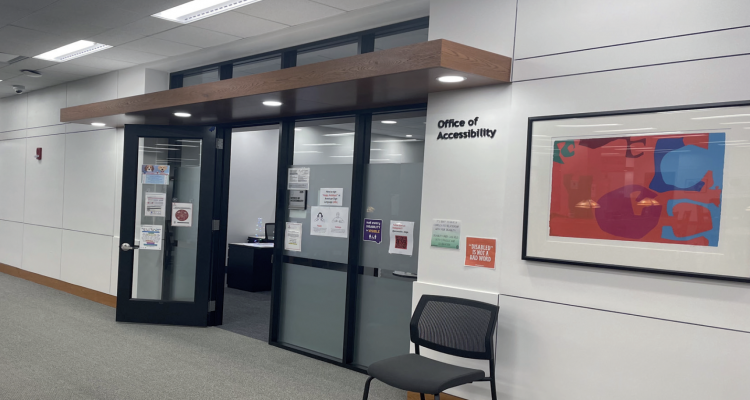Fairfield University students all have the right to an equal and fair opportunity on campus. The Office of Accessibility, which operates out of the main floor of the DiMenna Nyselius Library, can be an extremely necessary tool to help Fairfield students with their Fairfield experience, given certain circumstances.
Whether it hinders their academics, or their on-campus living and dining experience, the Office of Accessibility is used to assist students with any accessibility-related accommodations they might need.
Leading the charge for the office is Megan Buxton, the director of accessibility at Fairfield. Being one of the only offices that works with both undergraduate and graduate students alike, Buxton and her staff ensure that Fairfield’s campus community is continuously being offered equal opportunities in the classroom and in residence halls.
Alongside Buxton is the Assistant Director of Accessibility, Jillian Kelly and Program Coordinator, Susie Filipowich. The staff works to proctor exams to students who may need extra time or a separate place to take the exam; the office provides two sectioned-off testing rooms for this reason. Professors are made aware of any accommodations at the beginning of the year, and Buxton works to train professors in any areas they may not be entirely well-versed in.
Just like any office on campus, the Office of Accessibility operates from 8:30 a.m. to 4:30 p.m., Monday through Friday, with the office being closed on weekends.
During final exams, however, the office is open 8 a.m. to 8 p.m. every single day of finals to ensure that everyone’s needs are being met.
The office controls one of the largest operations at Fairfield.
“We have close to 1,300 students who have disclosed disabilities to our office,” Buxton stated. “We are all-hands-on-deck. So what I mean by that is, I may be doing faculty training, but then I walk out and a student hands me an exam, and then I am scanning it and sending it to the professors.”
The “all-hands-on-deck” mentality is always present in the office, where upwards of 500 note takers are taking notes in class and sending the documents to the office.
“It’s really the simplest thing, you just diligently record and upload detailed notes for students with acknowledged disabilities to help assist them with their studies,” notetaker Carly Manzi ‘23 commented. “Plus it’s a great way to earn a little bit of money while also helping your peers.”
These note takers are registered under payroll and with the human resources department, which shows how wide the scope of the office actually is.
“I always laugh when I say I don’t think there’s a department on campus that we don’t talk or coordinate with,” Buxton commented.
Many requests for exam proctoring come through the office, with Filipowich coordinating all email communications with students.
With the large number of students looking for their services, the turnaround time for requests to be fulfilled could take up to two weeks. This is not a fault of the office, but merely is a reflection of the amount of requests they need to take on at once.
“We have broken multiple weeks where we’ve proctored over 100 [exams],” Buxton said.
Buxton also highlighted the need for professors to receive education regarding accommodations, which would streamline the process of how the office of accessibility works.
Multiple students added their experiences with the office.
“The office of accessibility is definitely helpful. The application process is so easy and the staff is willing to help you in any way they can,” Tess Morrissey ‘23 stated.
Others acknowledge the turnaround time for requests, like Jake Cartisano ‘23, who said “The Office of Accessibility is a very nice group of individuals and the accessibility portal is easy to use, however, the entire process is slow and could be made a little quicker.”
Sometimes, with the sensitivity of applications the office receives, there may need to be a longer or more extensive process in fulfilling the student’s request for accommodations. The Office of Accessibility believes that if professors were better trained in academic accommodations from the get-go, this would improve the turnaround time for certain requests.
In the lobby area of the Office of Accessibility, they have a bulletin board which includes notes from anonymous students about things that professors have done well in terms of accommodations, or things that they wish were done differently at the academic level.
One reads, “Uploading the powerpoint to Blackboard before class is so helpful!” Another states “Understand students’ grades do not always represent their hard work.” Finally, another says “I like when professors understand that we have a life outside of that class.”
All of these requests and comments are important and helpful to the Office of Accessibility, who are responsible for making sure that professors are aware of such accommodations.


Leave a Reply